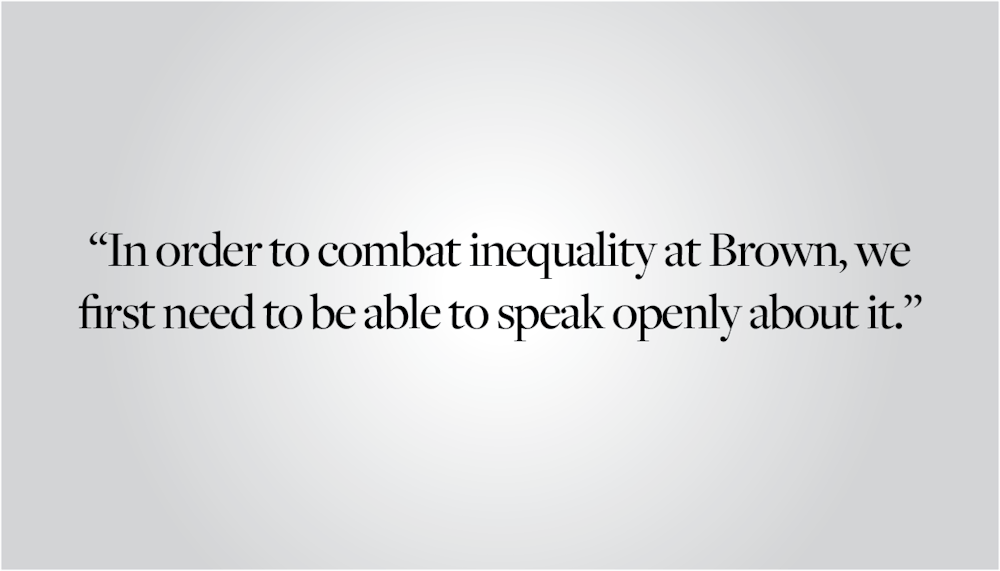The recent Supreme Court decision ending race-conscious admissions in higher education made waves at college campuses across the nation. Many people are justifiably outraged that the slow progress towards racial diversity at our universities is being undone, and that current racial inequalities at predominantly white institutions like Brown will be left unchanged. That said, there is another form of inequality present at our university that could still be addressed in admission policies without getting the Supreme Court in a tizzy. Wealth inequality is a major issue at schools across the country — especially at pricey Ivy League institutions. At an institution with such a severe wealth gap, we still seem to be incapable of truly addressing the problem. In order to combat inequality at Brown, we first need to be able to speak openly about it.
But could economic inequality at Brown really be that severe? Brown’s need-blind admission policy for domestic applicants seems to suggest that wealth is not taken into account in admissions decisions in a way that would benefit wealthier students. But that’s not really the full picture of how it works. A student’s financial situation can be crucial in determining the strength of their application, since easy access to tutors, extracurricular activities, advisors, essay editors, etc. relies on wealth. This isn’t even taking into account the privileges afforded to legacy applicants, who are more likely to come from high-income households. So in reality, wealth can determine a lot about whether someone gets admitted to a college, even in a world where admissions officers ignore the statistic of household income in their decisions.
While it may not be surprising that an Ivy League institution like Brown would have a wealth divide, did you know it’s one of the worst, even among the Ivies? In 2017 a paper estimated that seventy percent of Brown students were above the 80th percentile for family income, with 47% of students being from the top five percent, the highest among the Ivy League. Brown also had the highest median family income of any of the Ivy Leagues — $204,200 — and the second highest number of students from the top one percent of income in the country. One of the most disheartening statistics from this study was that only one and a half percent of Brown students move from the bottom quintile of income to the top as adults Clearly, we not only have a disproportionately wealthy student body, but do little to enable upward mobility. Limited information means that this 2017 study is still the best resource for analyzing economic inequality at Brown. But after the economic strain most Americans faced during the COVID-19 pandemic, with income inequality beginning to rise again, I have a feeling a 2023 version of the study would only have worse results.
When I uncovered these statistics, I felt deeply disturbed by the severity of wealth inequality at Brown. But why was this so shocking? I think the answer is pretty straightforward: A very progressive environment like Brown’s is not one in which flaunting extreme wealth would be well-received, and the politics of many Brown students put us in direct opposition to the existence of the wealth divide in America. No one wants to become the figurehead for the Brown bourgeoisie, so — to avoid a Marie Antoinette moment — the quickest solution is simply to hide one’s wealth. Many students thrift most of their clothes even though they don’t need to, never display any high-end labels, don’t talk or post about their many vacation homes and avoid conversations around financial aid and who pays for their apartment altogether. While these actions may not initially seem harmful, they keep us from speaking openly about the effect our financial backgrounds have on our college experience.
Coming from South Africa, the country with the current worst wealth inequality in the world, I have found the wealth gap to be an unavoidable topic. But being aware of and taking accountability for your wealth and privilege is not a noble act; it should just be a given for any white South African like myself. On South African university campuses, economic disparities have been the subject of some of the most impactful student protest movements, including the famous #FeesMustFall protests, but this is not so much the case here. The “hide the money” tactics employed by many Brown students have permitted an environment where we pretend wealth isn’t a factor at all. There definitely are parts of the Brown community that focus on and actively address inequality, like the Undocumented, First-Generation College,and Low-Income Student Center. But are we really giving the issue the collective energy it warrants?
We should use our power as students to pressure the Brown administration into accepting applicants from a wider range of economic backgrounds. We should hold our community and ourselves accountable for the things we do that perpetuate inequality — whether that’s something as extreme as creating elitist structures like the infamous Granoff dinners, which brought together the school’s wealthiest students for an evening meal, or something less obviously problematic like organizing activities with friends that not everyone can realistically afford. We should show our support for the existing initiatives that are already addressing inequality at Brown. But most importantly, we have to start talking about wealth inequality on campus as a problem.
Paulie Malherbe ’26 can be reached at paulie_malherbe@brown.edu. Please send responses to this opinion to letters@browndailyherald.com and other op-eds to opinions@browndailyherald.com.
This column is part of a series of opinion pieces about the impact of wealth and inequality on politics that receives financial support from the Stone Initiative on Inequality. The Herald maintains editorial independence over the published work.





